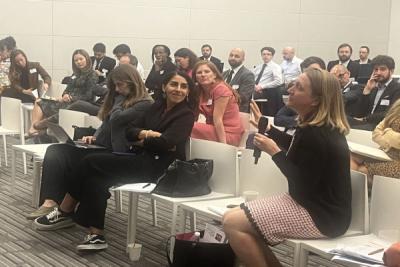EuComMeet
IDEA Director Dr. Michael Neblo is an advisor to the EUComMeet initiative, which aims to examine the circumstances where deliberation and representation can be effectively used to alleviate the challenges affecting liberal representational democracies. This initiative will experiment with potential ways of systematically embedding deliberative practices and institutions within the framework of the European Union, and will also explore the potential social effects of deliberation in a European context.
Goals
This project has two primary goals: (1) to experiment ways of systematically embedding deliberative practices and institutions within the European Union framework; and (2) to explore how deliberation can help reduce polarization, strengthen European (rather than nationalistic) identity, encourage inclusiveness, and narrow the representative gap between policymakers and constituents. To address these two goals, EUComMeet is or will:
Bring together a nine-partners consortium, coordinated by the University of Siena, consisting of leading universities and non-governmental organizations within the European Union. The blend of scientific and non-profit organizations in this consortium enable the EUComMeet to more effectively engage with both key stakeholders and the general public.
Adopt a proactive research strategy to develop viable solutions to improve the democratic practice.
Design novel Participatory Spaces that include citizens, policy makers, and stakeholders. These Participatory Spaces will be designed on an innovative M4D2 (meaning “Multi-stage, Multi-level, Multi-mode, Multi-lingual, and Dynamic Deliberative”) approach. This approach will allow these spaces to be flexible and easy-to-use by participants who speak different languages, and therefore allows these spaces to be effectively implemented across borders. In this project, Participatory Spaces will be implemented in five countries: France, Germany, Ireland, Italy, and Poland.
The M4D2 Approach: What is It?

The M4D2 approach stands for: Multi-Stage, Multilevel, Multi-mode, Multilingual, Dynamic, and Deliberative process. These constituent parts are explained below:
Multi-stage: the deliberative process needs to accommodate a diverse array of aspects, ranging from the way in which deliberators are selected to the ways that deliberation actually occurs (as an example: in-person, online, or in a hybrid format). Because of this, Participatory Spaces are segmented into three main stages: inputs (such as participant recruitment), throughputs (such as different management structures), and outputs (the way information is analyzed).
Multilevel: once fully operational, Participatory Spaces are expected to be utilized by political officials at the local, national, and European Union level. EUComMeet is designed to make this process as easy as possible by both scaling from the national level upward to the European level as well as from the European Level down to the local level.
Multi-mode: Participatory Spaces will be designed to be inclusive to all participants. These spaces will include different modes of interaction – such as text-based, online video, and audio – while also alternating between human and automated moderation
Multilingual: as Participatory Spaces are envisioned to eventually operate in a diverse host of European nations, these spaces are designed with an automated translation and transcription system. Through this, participants of diverse linguistic backgrounds will be able to seamlessly deliberate – not as members of smaller, national spaces but as a truly European one.
Dynamic: the goal for Participatory Spaces is to embed techniques of deliberative democracy in the existing political framework. To do this, EuComMeet will bring these spaces to policymakers on the local, national, and European levels so that a regular, periodic interaction between stakeholders, citizens, experts, and policymakers will be made possible.
Deliberative: Participatory Spaces utilize deliberative theories, experiments, and practices to foster more constructive and positive forms of democratic communication between different levels of society.
